Fresh Produce News
UK meat leaders have expressed disappointment over the reporting of a US-based study which claimed that beef production was 10 times more damaging to the environment than other livestock.
The study, published in the Proceedings of the National Academy of Sciences (PNAS), claimed that by applying a uniform methodology to data from the US Departments of Agriculture, the Interior and Energy, it showed that beef was far ahead of other proteins when it came to environmental impact.
A summary of the study said: “The authors found that impacts of dairy, poultry, pork, and eggs were mutually comparable within a factor of two. Beef, however, required 28 times more land, 11 times more irrigation water, five times more greenhouse gas emissions, and six times more reactive nitrogen fertiliser than the respective average burdens of the other four livestock categories.

”Plant-based production, however, including potato, wheat and rice, on average needed “two to six times fewer resources per calorie consumed than non-beef livestock”, it added.
The news has been widely reported across mainstream media, but UK meat bosses have hit back at the coverage, which they said failed to recognise that US production differed considerably from UK grass-fed production.
Nick Allen, sector director for red meat levy body Eblex, said: “Our rain-fed pasture system means we have one of the most efficient and sustainable livestock production systems in the world. In the UK, cattle and sheep primarily convert grass, which cannot be used to feed people, into nutritious food for our growing population. We have very little reliance on irrigation; in fact it takes just 67 litres of water to produce 1kg of beef.
“There are also additional environmental benefits of grazing ruminants, not least in terms of landscape management and maintaining biodiversity, yet livestock production still comes in for undue criticism.
”One of the authors of the report Professor Gidon Eshel, speaking to The Guardian newspaper, acknowledged that US grain-fed production systems exacerbated the issues surrounding feed inefficiency, but he said that even grass-fed cattle had greater environmental footprints than other animal products.
He said the aim of the study was to change the consumer mind-set: “While my work in recent years has clearly demonstrated that plant-based diets exact lower environmental costs than animal-based ones, in the new paper we recognise that this and related work by others have changed little in US diets; people still eat animal-based products with an ever-increasing gusto.
“Our study has a number of implications. First, it can help environmentally minded individuals make environmentally better dietary choices. Perhaps more importantly, the paper can also help inform US agricultural policy.”
While Israel’s military bombardment of Gaza continues, Hamas’s rocket fire is pushing up prices of fruit and vegetables in Israel, as workers flee.
Israel’s recent and ongoing military assault on the Gaza Strip has once again brought death and destruction to what many commentators were already coining the world’s largest open-air prison.
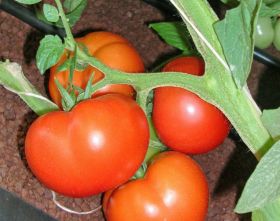
According to Israeli officials, the campaign has been implemented to halt the rocket fire into Israel by Hamas, the organisation that governs Gaza and is labelled a terrorist group by many countries, including Israel, the US, the EU and Japan, although many nations, such as China, Russia, Iran and much of the Arab world, do not.
A report in Globes stated that the rocket fire had led to a jump in prices of certain fruit and vegetables in Israel due to irregular harvesting, as some farmers refuse to work in such conditions.
Wholesale tomato prices have risen by 47 per cent to ILS 6.5-6.8 (€1.40) per kilogram, melons by more than 180% to ILS 5.6-6 (€1.20-€1.30) per kilo.
Cauliflower prices have increased by 130% to ILS 7.6-8 (€1.64-€1.73) per kilogram, while cabbages are up by 46%.
Aharon Bitton, a farmer from Kibbutz Erez, commented: “The workers don’t want to work. The Thai, Bedouin, and Sudanese workers are all fleeing out of fear.”
Farmers from the Ein Yahav-based Yofi Shel Yerakot (Beauty of Vegetables) Cooperative told the Jerusalem Post that vegetables that had not been harvested in time and were therefore over-ripe may have to be sold to the Palestinian vegetable market in the West Bank.
Critics of the latest Israeli attacks argue that these actions stand no hope of bringing peace since they do not address the continuing illegal occupation of Palestinian territory by Israel, nor its illegal blockade on Gaza.
Beef, lamb and pig meat production has increased on last year, according to the latest slaughter figures from Defra.
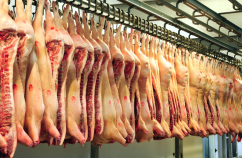
The figures compare June 2013 with June 2014 and show clean sheep slaughterings – which refers to animals that have been bread purely for slaughter – at 907,000 head for the month, just over 8% higher than in June 2013, while mutton and lamb production was at 21,000 tonnes, 5% higher than in June 2013.
Clean pig slaughterings were 3.7% higher than last June at 772,000 head and pigmeat production was 6% higher at 64,000 tonnes.
Although prime cattle slaughterings were down 0.5% and 150,000 head this year, beef and veal production was almost 3% higher than June 2013 due to continuing heavy carcass weights, according to Defra.
Stephen Rossides, director of the British Meat Processors’ Association, commented on the cattle figures: “Overall [there was] lower beef production in June. But I think for a fuller picture of the market, a longer time frame needs to be taken, as well as trends in imports, exports, retail demand and weather factors.”
Defra said the report is subject to revision in August when they will publish the updated figures.
Judges unable to split Waitrose and Sainsbury’s as 21st Bramley apple awards celebrate industry excellence
To a retailer, sharing a stage with a competitor is usually the ultimate no-no.
But it was all smiles at the Brammy Awards yesterday as representatives of Sainsbury’s and Waitrose posed for photos after becoming the first joint-winners of the Best Bramley Retailer of the Year gong.
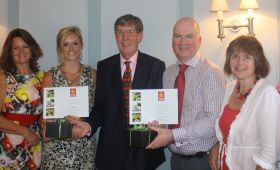
The 21st Brammy Awards was held at Quo Vadis in London, having skipped a year due to the poor crop in 2013. Judges said they were unable to split the two retailers, with Sainsbury’s having shown widespread support for Bramley within its Eat Well For Less campaign, recipe development with Jack Monroe and social media activity, while Waitrose impressed with its dedication to promoting the versatility and cooking qualities of the fruit.
Best Manufacturer of a Savoury Bramley Product was Darlington & Daughters for Mrs Darlington’s Autumn Fruit Chutney, while Tesco Apple Pie by Kensey Foods won the Sweet Bramley Product category.
Best Bramley Apple Sauce went to Cottage Delight, while Chegworth Valley got the nod for best Bramley Apple Drink.
Mr Kipling was named Best Catering/Foodservice Company, and in the individual categories The Times’s Lindsey Bareham won Best Bramley Food Writer and Tom Kerridge was Best Media Chef.
Adrian Barlow, chairman of the Bramley Apple Campaign, said: “The awards present the industry with an opportunity to recognise retailers, manufacturers, catering companies, journalists and chefs who are championing the iconic Bramley apple. The winners have shown outstanding support for Bramley apples over the past year through the quality and breadth of products they have developed, the innovative promotional activities they have undertaken, and their highlighting of Bramley in the media. I am delighted that we have this opportunity to celebrate their achievements.”
Fifteen tonnes of UK-grown stone fruit now on sale in UK, with a huge increase in production lined up to seize export opportunities
The first substantial volume of British-grown apricots have entered the market.
For the next six weeks, stonefruit lovers will be able to buy 15 tonnes of apricots grown near Staplehurst, Kent in 200 Tesco stores across the UK.
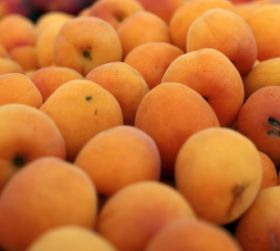
Weather permitting, production could be up to 100 tonnes next year.
The release coincides with a growing UK love affair with the fruit, as in the last year, Brits bought 18 per cent more apricots than the previous year, according to Kantar Worldpanel data.
The arrival of homegrown apricots is also to be celebrated as the British growing season will allow production to be taken into September – a time when no other country in the world produces apricots.
Tesco lead fruit development manager Natalie Slack, said: “Not only do British shoppers enjoy arguably the best strawberries, cherries, apples and pears in the world grown here in the UK, but soon we could also have an apricot industry to rival that of France.
“Until a few years ago it was near impossible to grow apricots in the UK because of the climate, but with the selection of the right varieties and pruning of the trees to suit our weather as well as Nigel’s tenacity as a grower this existing project has been made possible.
“And ironically, the cooler British night time temperature is set to produce very high-quality apricots, as the fruit grows more slowly resulting in a more intense taste and stronger, richer colour.”
Tesco started working on the project with one of the UK’s biggest stone fruit growers, Nigel Bardsley, five years ago with view to launching major scale English apricot production.
Bardsley, a Tesco supplier for 25 years, enlisted a team of experts comprising breeders, agronomists and growers to create a production plan which culminated in the planting of eight hectares of orange-fleshed, French-type apricots.
After visiting French growers a few years ago, Bardsley planted 5,000 apricot trees across eight hectares of land, and the first fruit from his orchards will start arriving in Tesco stores this week (w/c 14 July).
Bardsley said: “There is a growing demand for apricots here in Britain, and if all goes well by next year I should see a return of 100 tonnes, and in the next two to three years an annual crop return of about 400 tonnes.
“When I heard about the new apricot cultivars that were available I jumped at the chance of getting these. The fruit we had before flowered too early, in March, when it was still too cold. It was far too risky which is why no one ever tried to grow them on a commercial basis.
“Generally, the British weather pattern has changed over the last few years and we now tend to be getting milder winters and later springs which suits apricot production.
“And because production will go into September then for the first time ever, we may soon have France, Spain, Portugal and other countries around the world buying apricots from Britain.”
Another meat body has expressed its concern at the fall in lamb prices as supply increases.
After Quality Meat Scotland (QMS) reported a cooling of lamb prices, Hybu Cig Cymru – Meat Promotion Wales (HCC) has joined the discussion, confirming that a greater number of lambs have come into market earlier than usual. Like QMS, HCC has also cited the strong pound against the euro as a contributor to the problem.

The UK beef industry has already been suffering from a farmgate price crisis, and summits have been held to find solutions.
John Richards, HCC’s industry information executive, said: “This year, thanks to a good lambing season and mild weather, there is a significant increase in the number of lambs now reaching the market. It must also be borne in mind that lambs are entering the market earlier this year, extending the season. It means that the traditional seasonal trend has occurred a few weeks earlier in comparison to other years.”
HCC said the falling lamb price highlights the importance of diversifying exports. Richards added: “This reinforces HCC’s strategy of looking for other markets around the world, so that we are not entirely dependent on one currency for our export trade. We are already exporting Welsh Lamb to the Middle and Far East, as well as Scandinavia and Canada, while working to gain entry into new markets including China and the USA.”
Weather conditions have been generous to Britain’s blackcurrant growers, with Ribena in line to get a sweet, bumper crop
British blackcurrant growers are reaping the benefits of ideal winter weather conditions, with this year’s – early – crop set to be as healthy as ever.
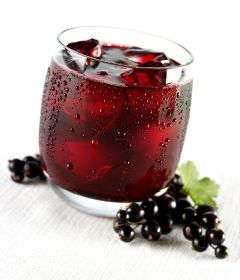
According to The Blackcurrant Foundation, early-season cold allowed for a good level of bud break and strong crop ripening, the winter rains ensured water-store in the ground, enabling the swelling that results in larger berries, and recent warmer, sunnier periods have improved brix levels to averages of at least 16%, meaning there will be a sweeter-tasting crop of British blackcurrants for 2014.
As a result, the foundation says it will be able to provide Lucozade Ribena Suntory Ltd with high-quality produce for Ribena, which accounts for upwards of 90% of Britain’s blackcurrant crop.
Jo Hilditch, chair of The Blackcurrant Foundation, said: “With Ribena continuing to maintain its place as the best-selling product range in the juice drinks sector with a value of £66.8 million and growing at a rate of 20.3% according to Nielsen data, it is vital that the foundation is able to provide large quantity and high-quality berries to assist Lucozade Ribena Suntory in driving growth within the soft drink sector.
“This season has experienced all the factors required for a strong-performing crop. We understand Lucozade Ribena Suntory’s need for high-quality and specially-bred British blackcurrants that go into Ribena and we are privileged to be able to continue fulfilling this requirement. We are very pleased to say that the berries are looking extremely healthy and the season is due to start earlier than in 2013.”
Blackcurrants are renowned for containing high levels of antioxidants, which can help to prevent Alzheimer’s, heart disease, eye strain, MRSA and urinary tract infections.
Retailer is working with lettuce supplier G’s to get more Icebergs on offer when good weather produces a crop flush
Tesco is to offer Icebergs to customers at two for 75p in a bid to boost sales and consumption of the leaf vegetable.
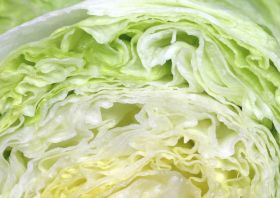
The retailer is working in partnership with G’s Fresh in what it calls “an effort to be more responsive to the natural peaks of the summer growing season”.
The two businesses are identifying where good weather is going to create a bumper crop, and setting up the special promotions in tandem with this to make extra lettuces available to customers at a lower price.
The first promotion went live in Tesco stores in early July, and also allows customers to mix and match their Icebergs with celery and beetroot from G’s Fresh.
Rick Clay, commercial manager for G’s Fresh, said: “This year Tesco gave us a base volume commitment for the whole of the season – something we’ve never had with any retailer before now – and we’ve worked together to come up with a plan to trade crop flushes as and when they occur. It’s all about being more responsive within the security of an underlying commitment.”
Adam Hill, Tesco’s salad sourcing manager, said: “This work is part of Tesco’s commitment to working in partnership with our suppliers and helping customers to tackle food waste from farm to fork.
“We want to make sure our customers benefit from the natural peaks in the growing season and over the coming months, customers and suppliers will see the benefits of this same approach across various British crops.”
The promotion will run until 26 July.
Thursday night’s SuperMeat & Fish Awards celebrated the best British supermarkets have to offer, with Tesco winning overall retailer of the year.

Tesco took home the title of Meat and Fish Retailer of the Year as well as the Head office Initiative Award.
Head judge Fred A’Court, who was impressed with the Tesco stores, said: “A high level of consistent quality in its product range, allied to attention to detail and good availability throughout its stores helped Tesco to a good win in this year’s awards. It is now making progress in creating warmer, friendlier and distinctive shopping zones in some of its stores that make customers feel comfortable and relaxed while they shop.”
Attending the prestigious event in central London Mark Green, who collected the overall retailer award for Tesco told Meatinfo.co.uk: “This is the award we wanted and why we entered.“ Tesco are committed to develop and train staff and our fresh food capability sets us apart. From a head office perspective we are committed to train our staff, over the course of the year we have trained 3,000 colleagues on how to skin our meat and fish, right through to the finished product. We are really proud of the products we sell and the service that we offer our customers.“ When you look at the competition whether it be Aldi, Lidl or Morrison’s, everybody has done a great job and it is extremely competitive, so we are extremely proud to come out on top.” Ed Bedington, editor of Meat Trades Journal which organised the awards, said: “Many congratulations to Tesco – a most deserved win. The results, which saw Tesco perform consistently well throughout, show the amount of work the retailer has been doing to improve its quality.”
A total of 13 product awards and seven regional store awards were given out at the glitzy event presented by musician and television personality Myleene Klass.

Best Overall Product was awarded to Marks & Spencer for its Steak and Old Peculier Ale Pie. Morrisons Camden scooped two awards for Best Store Team and Best Meat Counter, while Tesco Superstore, Launceston, Cornwall was awarded Best Fish Counter. The most innovative product was given to Tesco for its Beef Lollipops with a Cherry BBQ Sauce.
This year’s ceremony also played host to the Tri-Nations Butchery Awards, held earlier in the day at the Great Yorkshire Show. This saw top butchers from Great Britain, Australia and New Zealand go head-to-head for the title. The Kiwis were crowned champions for the second consecutive year.
Bedington added: “This competition is a great showcase for the supermarket sector, and this year was no different, with a superb range of entries and a close-fought battle for every category. We look forward to seeing how Tesco defend their title next year, as I know the other retailers will be itching to get their hands on the crown.”